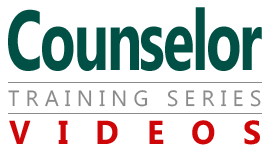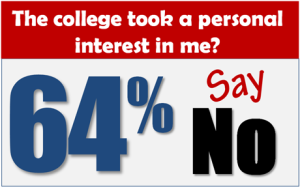We recently launched a series of free video training tutorials on our website and YouTube channel aimed at making your counselors even better at their jobs. On our website you’ll find an ever growing list of admission counselor tutorials. Subscribe to our YouTube channel for more tutorials, powerful data from national co-sponsored studies and interviews with some of your peers.
Every college admission counselor in the country talks about their college’s value proposition. That’s a given. We all know how important it is to present your college’s unique attributes to prospective students. The question is this: Are you presenting those distinctive characteristics in a way that has impact?
In you are using our four-step communication model, (review here) you have gathered all of the information you need to fully understand the needs, preferences and motivations of the prospective student.
Now it’s time to present the value of your institution. It’s time for you to demonstrate how you can deliver what the student wants.
That is why the supporting phase is a critical part of the communications model. Supporting helps the student understand how you can meet their needs and give them exactly what they want.
How do you do it? You acknowledge what they’ve said to you, confirm that your understanding is correct, and then present the specific ways in which your institution can provide what they want and need.
When do you begin the supporting phase of your conversation? After probing, when the student has expressed their needs, you fully understand those needs, and you know that your institution can meet them.
There are many ways to support. However, there are two methods that are simple to implement and highly effective: Third-party validation and telling stories.
Third-Party Validation
Third-party validation involves supporting your promise of value by referencing something or someone the student can relate to and trust.
Using third-party validation as a communications tool has been around for decades, it may even qualify as the original “social media” tool. As the counselor, you are supporting your promise of value by referencing a trusted expert that the student can relate to and trust. In this case, the “trusted expert” is one or more of your current students who previously grappled with the same concerns or desired the same attributes in a college.
Here is a real-world example shared by a counselor (David) in one of our recent Interactive Training Workshops. David knew that Ashley, a prospective student from a small high school, was very interested in receiving a high-level of personal attention. He knows that his school can deliver on that promise, but he knows that simply promising it forces Ashley to take his word for it.
Instead, he adds third-party validation to give strength and credibility to his promise. He turns the abstract into something real and relatable.
David said, “I understand your need for personal attention. Let me introduce you to Carey. She is a junior and an intern in the office here. She was concerned with the same thing before she enrolled. She found that help and support was abundant on this campus and now says it is one of our strongest attributes.”
Storytelling
Storytelling also serves as a persuasive method of supporting your claims of value. It not only engages the prospective student, it also personalizes what you are telling them. It makes it real and believable.
There is scientific research that supports the power of storytelling. Leo Widrich, COO and co-founder of Buffer, does a great job of explaining the science in layman’s terms. “If we listen to a PowerPoint presentation with boring bullet points, a certain part in the brain gets activated…Overall, it hits our language processing parts in the brain, where we decode words into meaning. And that’s it, nothing else happens, describes Widrich.“When we are being told a story, things change dramatically. Not only are the language processing parts in our brain activated, but any other area in our brain that we would use when experiencing the events of the story are too.”
I’m sure your college has hundreds, if not thousands, of compelling stories that paint a picture of the great and memorable experiences with you students have had with you.
Record and categorize these stories so that they can be easily shared at the right time, in the right situation, and with the right student. Many of the colleges we work with actually keep a database, sorted by topic, of these narratives and some have even hosted interdepartmental competitions to find the best student success stories.
Most importantly, supporting is the phase of your conversation where a student’s interest either gets stronger or weaker. It’s a pivotal point and you need to employ the proper techniques to get it right.
If you’ve thought about helping your staff with professional development, now is the ideal time to train and motivate your staff. Email or call me if you are interested in how we can help. Continue the conversation on Twitter @LongmireCo. For more information about Longmire and Company and the tools we have to offer, click here. Be sure to subscribe to Versions of Conversion today so you can stay up-to-date.
 Rick Montgomery is as an Enrollment Strategist at Longmire and Company. With over 20 years in higher education marketing, he brings an innovative and dynamic approach to helping colleges and universities meet their enrollment goals. Rick can be reached at 913/492.1265 x.708 or via email at rmontgomery@longmire-co.com.
Rick Montgomery is as an Enrollment Strategist at Longmire and Company. With over 20 years in higher education marketing, he brings an innovative and dynamic approach to helping colleges and universities meet their enrollment goals. Rick can be reached at 913/492.1265 x.708 or via email at rmontgomery@longmire-co.com.


 Bob Longmire is President of Longmire and Company, Inc. He is a recognized expert on the topic of how prospective students and parents form their college selection decisions – and how colleges can use that knowledge to grow and control their enrollment. He can be reached at (913) 492-1265, ext 709 or at
Bob Longmire is President of Longmire and Company, Inc. He is a recognized expert on the topic of how prospective students and parents form their college selection decisions – and how colleges can use that knowledge to grow and control their enrollment. He can be reached at (913) 492-1265, ext 709 or at


 Rick Montgomery is as an Enrollment Strategist at Longmire and Company. With over 20 years in higher education marketing, he brings an innovative and dynamic approach to helping colleges and universities meet their enrollment goals. Rick can be reached at 913/492.1265 x.708 or via email at rmontgomery@longmire-co.com.
Rick Montgomery is as an Enrollment Strategist at Longmire and Company. With over 20 years in higher education marketing, he brings an innovative and dynamic approach to helping colleges and universities meet their enrollment goals. Rick can be reached at 913/492.1265 x.708 or via email at rmontgomery@longmire-co.com.
